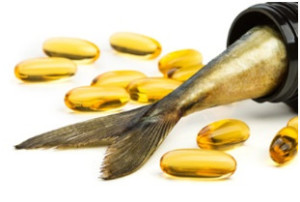Author: Dr. Stephen Chaney
Sometimes I write articles pointing out the fallacies in the headlines you’ve been reading. Other times I write articles because major studies have provided a definitive test of a current paradigm. And sometimes I write articles about small studies that have the potential to change existing  paradigms. This week’s article falls in the latter category. This week’s article is on omega-3 and ADHD in children. More precisely, I’m going to review a study looking at the role of the omega-3s DHA and EPA in reducing ADHD symptoms.
paradigms. This week’s article falls in the latter category. This week’s article is on omega-3 and ADHD in children. More precisely, I’m going to review a study looking at the role of the omega-3s DHA and EPA in reducing ADHD symptoms.
Amid growing concern about the side effects and overuse of the stimulant medications used to treat ADHD symptoms in children, many parents have been looking for natural approaches for controlling ADHD symptoms. One of the most popular natural approaches has been omega-3 supplements, primarily the long chain omega-3s, DHA and EPA.
However, not everyone agrees that DHA and EPA are effective for reducing ADHD symptoms. Here is a brief summary of what we know:
- Children with ADHD and learning difficulties generally have lower tissue levels of DHA and EPA than children without those deficits.
- Animal studies show that DHA-deficient diets decrease neuron size and are associated with hyperactive and compulsive behavior.
- Some clinical studies have reported a significant decrease in ADHD symptoms when children were given omega-3 supplements, while other studies found no effect of omega-3 supplementation on ADHD symptoms. This has led to considerable confusion as to the value of omega-3 supplementation in children with ADHD.
However, recent studies have led to a certain amount of clarity about omega-3 and ADHD in children. In particular:
- Two recent meta-analyses of all high quality published studies have concluded that omega-3 supplements have a beneficial effect on ADHD symptoms, but the effect is relatively small (Bloch and Qawasmi, Journal of the American Academy of Child and Adolescent Psychiatry, 50:
 991-1000, 2011; Sonuga-Burke et al. American Journal of Psychiatry, 170: 275-289, 2013).
991-1000, 2011; Sonuga-Burke et al. American Journal of Psychiatry, 170: 275-289, 2013).
- One recent study showed that when omega-3 supplementation was combined with a stimulant medication, it improved the effectiveness of the medication, which allowed physicians to decrease the amount of medication they prescribed (Barragan et al, Journal of Attention Disorders, doi: 1177/1087054713518239, 2014).
- Previous studies have shown that omega-3 supplementation is most effective in the children who are the most deficient in DHA and EPA at the beginning of the study. This is no surprise.
However,what you may not know is that many otherwise healthy children in this country have at least some degree of DHA and EPA deficiency. That’s because major food sources of EPA and DHA, such as salmon and sardines, are not most kid’s favorite foods.
Do Omega-3s Improve Attention Span In Children?
The most recent study (Bos et al, Neuropsychopharmacolgy, 40: 2298-2306, 2015) was a double blind, placebo controlled study looking at the effectiveness of omega-3 supplementation in reducing ADHD symptoms in boys between 8 and 14 years old. It differed significantly from most previous studies in that:
- It included a matched group of boys who had not been diagnosed with ADHD.
- It used a 1:1 ratio of DHA to EPA, which resulted in a greater intake of DHA than in many of the previous studies.
The study included 40 boys, aged 8-14, who had been diagnosed with ADHD and 39 matched controls who did not have ADHD. Both groups were either given margarine containing 650 mg/day of both DHA and EPA or a placebo margarine containing an equal amount of monounsaturated fatty acids for 16 weeks. Compliance with the study was measured in terms of the amount of margarine consumed and the levels of DHA and EPA found in cells obtained by a cheek swab. ADHD symptoms (particularly attention span, rule-breaking behavior and aggression) were assessed on the basis of standardized parent-rated child behavior assessments. The results of the study were:
- At the start of the study, the children with ADHD scored higher on all measures of ADHD symptoms. No surprise here.
 The children with the lowest omega-3 levels at the beginning of the study scored highest on all measures of ADHD symptoms. This is also not surprising given the results of previous studies.
The children with the lowest omega-3 levels at the beginning of the study scored highest on all measures of ADHD symptoms. This is also not surprising given the results of previous studies.- Omega-3 supplementation increased attention span in boys with ADHD, and the improvement in attention span correlated with an increase in omega-3 status. No improvement was seen in other symptoms of ADHD (rule-breaking behavior and aggression).
Since different studies tend to use different symptom assessments to measure the severity of ADHD, this may explain why some of the previous studies on omega-3s and ADHD symptoms have come up empty. The authors also suggested that some previous studies may have come up empty because the omega-3 supplements they used were low in DHA.
What Is The Significance Of This Study?
Because this study included a control group of boys without ADHD, it offers a whole new perspective on the importance of omega-3s for children. For example, this study showed:
- Omega-3 supplementation improved attention span equally well in boys with and without ADHD. This is perhaps not surprising. If you have ever had a child in the 8 to 14 year old range, you know their attention span could stand a bit of improvement.
However, when you think about it, this study represents a potential paradigm shift in how we think about omega-3s and childhood behavior. The real significance of this studyis that it suggests that omega-3 supplementation may be beneficial for any child with poor attention span, not just for children with ADHD. This interpretation would be fully consistent with previous studies showing that omega-3 supplementation improves cognitive function and reading skills in children.
The Bottom Line
- Previous studies have suggested that the long chain omega-3 fatty acids DHA and EPA are modestly effective at improving ADHD symptoms in children, and that they are most effective in children with the lowest omega-3 status at the beginning of the studies.
- The current study showed that supplementation with DHA and EPA improved attention span in boys aged 8-14 with ADHD, but did not improve other ADHD symptoms such a rule-breaking behavior and aggression.
What does this mean to you if you have a child with ADHD?
- If the ADHD symptoms are mild and mostly relate to attention span or learning skills, omega-3 supplementation alone may be enough to make a difference. Based on this study you might want to choose an omega-3 supplement that is rich in DHA.
- If the ADHD symptoms are severe, you will probably need to include omega-3 supplementation as part of a more holistic natural approach for controlling the symptoms.
- Finally, if a holistic natural approach is just too difficult to manage, the good news is that recent studies suggest that omega-3 supplementation makes ADHD medications more effective, which means your child’s physician may be able to reduce the dose of medication if you include omega-3 supplementation along with the medication.
This study was unique in that it also included a control group of 8-14 year old boys without ADHD and found that omega-3 supplementation was equally effective at improving attention span in children without ADHD.
- This is a single study, but if it is replicated by future studies it suggests that we may need to change our paradigm. What we have been thinking about omega-3 supplementation for children may be all wrong. Perhaps we should stop thinking of it as a supplement that might help with ADHD symptoms and start thinking of it as a supplement that might help children improve their attention span and mental focus whether they have been diagnosed with ADHD or not. This would certainly be consistent with previous studies showing that omega-3 supplementation improves cognitive function and reading skills in children.
One final thought:
- This study was performed with boys because they are more prone to ADHD symptoms than girls. However, based on numerous previous studies it is safe to assume that it is likely to apply equally well to girls with and without ADHD.
These statements have not been evaluated by the Food and Drug Administration. This information is not intended to diagnose, treat, cure or prevent any disease.
